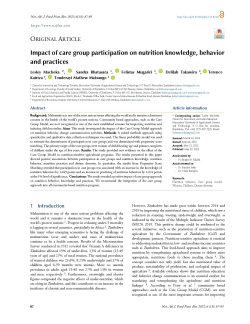Main Article Content
Impact of care group participation on nutrition knowledge, behavior and practices
Abstract
Background: Malnutrition is one of the most serious issues affecting the world and it remains a dominant concern in the health of the world’s poorest nations. Community based approaches, such as the Care Group Model, are now recognized as one of the most established avenues for improving nutrition and reducing child mortality.
Aims: This study investigated the impact of the Care Group Model approach on nutrition behavior change communication activities.
Methods: A mixed methods approach using quantitative and qualitative data collection techniques was used. The linear probability model was used to estimate the determinants of participation in care groups and was determined with propensity score matching. The primary target of the care groups were women of child-bearing age and primary caregivers of children under the age of five years.
Results: The study provided new evidence on the effect of the Care Group Model in nutrition-sensitive agricultural programs. The results presented in this paper showed positive associations between participation in care groups and nutrition knowledge, nutrition behavior, nutrition practices and dietary diversity. In particular, the results from Propensity Score Matching revealed that participation in care groups was associated with an increase in the knowledge of nutrition behaviors by 1.449 points and an increase in practicing of nutrition behaviors by 1.074 points at the 1% level of significance.
Conclusions: The study revealed a positive impact of care group approach on nutrition behavior, knowledge and practices. We recommend the integration of the care group approach into all community-based nutrition program.







